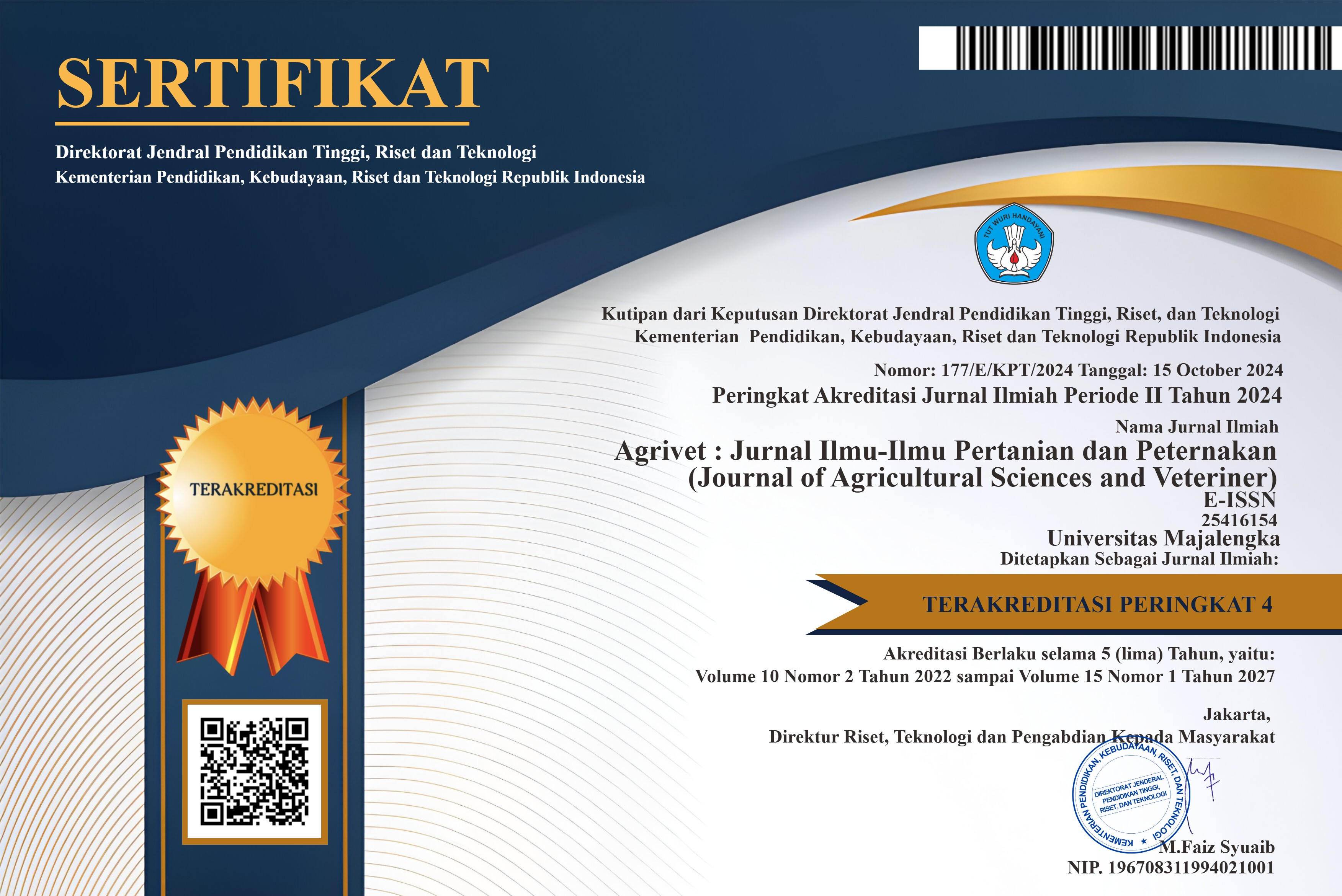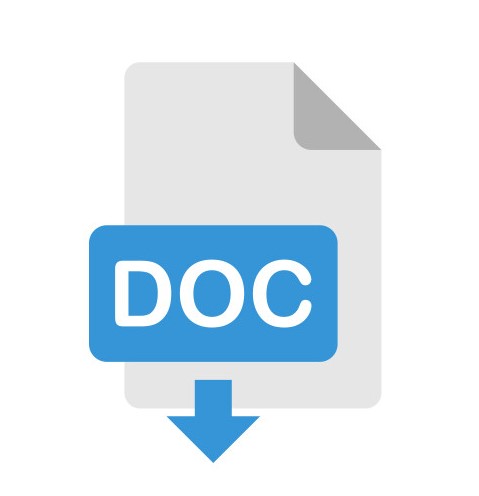Potensi fitokimia daun belimbing wuluh (Averrhoa Bilimbi L.) dengan pengeringan berbeda sebagai kandidat antibiotik alami broiler
DOI:
https://doi.org/10.31949/agrivet.v11i1.5746Abstract
This study aimed to determine the phytochemical potential of belimbing wuluh leaves (Averrhoa bilimbi L.) as natural antibiotic candidates for broilers. Belimbing wuluh leaves were processed by drying them in direct sunlight, indirect sunlight, and an oven at 60 °C. The obtained data were descriptively analyzed. The parameters measured were the phytochemical screening test and the Escherichia coli antibacterial test. The results of the phytochemical screening test for starfruit leaves, indirect sunlight drying method, direct sunlight method, and 60 °C oven drying, positively contained phenolic compounds, alkaloids, flavonoids, and steroids; however, the three drying methods did not contain triterpenoid compounds. The results of the activity test for the inhibition of starfruit leaf bacteria in the three drying methods showed positive inhibition of Escherichia coli bacteria, with the largest diameter of the inhibition zone produced in the 60 °C oven drying process. It can be concluded that drying starfruit leaves using an oven at 60℃ produces phenolic compounds, flavonoids, saponins, alkaloids, and steroids, can inhibit Escherichia coli bacteria with an inhibition zone diameter of 4.30 mm and starfruit leaves have the potential to be used as a candidate broiler natural antibiotics.
Keywords:
Belimbing wuluh (Averrhoa bilimbi L.), phytochemical, drying, antibiotics.Downloads
References
Afifi, R. Erlin, E., dan Rachmawati, J. 2018. Uji Anti Bakteri Ekstrak Daun Belimbing Wuluh (Averrhoa bilimbi L) Terhadap Zona Hambat Bakteri Jerawat Propionibacterium acnes Secara In Vitro. Quagga: Jurnal Pendidikan dan Biologi, 10(1), 10-17.
Aziz, M. A., Rahman. S., Islam. M and Begum. A. A. 2014. Comperative antibacterial screening and cytotoxic potential of various extracts of leaves of Averrhoa bilimbi. Int J Pharm Sci Res.5(3):913-18.
Bernard, D., Kwabena, A. I., Osei, O. D., Daniel, G. A., Elom, S. A., and Sandra, A. 2014. The Effect Of Different Drying Methods On The Phytochemicals and Radical Scavenging Activity Of Ceylon Cinnamon (Cinnamomum zeylanicum) Plant Parts. European Journal of Medicinal Plants.4(11): 1324–1335.
Bidura, I. G. N. G., Candrawati, D. P. M. A., & Sumardani, N. L. G. 2007. Pengaruh Penggunaan Daun Katuk (Saurupus Androgynus) dan Daun Bawang Putih (Allium Sativum) dalam Ransum terhadap Penampilan Ayam Broiler. Majalah Ilmiah Peternakan. 10(1). 164233.
Chan, E.W.C., Y.Y, Lim., S.K, Wong., K.K, Lim., S.P, Tan., F.S, Lianto., and M.Y, Yong. 2009. Effects different drying methods on the antioxidant properties of leaves and tea of ginger species. Food Chemistry. 113: 166–172.
Chu, D.C. and Juneja, L.R. 1997. General Chemical Composition of Green Tea and Its Infusion. In: Yamamoto, T., Juneja, L.R., Chu, D.C. and Kim, M., Eds., Chemistry and Applications of Green Tea, CRC Press, Boca Raton, 13-22.
Das, S. C., Sultana, S., Roy, S., and Hasan, S. S. 2011. Antibacterial and cytotoxic activities of methanolic extracts of leaf and fruit parts of the plant Averrhoa bilimbi (Oxalidaceae). American Journal of Scientific and Industrial Research. 2(4): 531-536.
Djafri, D., dan Kurniawati, B. 2019. Efektivitas Infusum Daun Belimbing Wuluh (Averrhoa bilimbi) Terhadap Pertumbuhan Streptococcus mutans. Cakradonya Dental Journal. 11(1): 8-12.
Halimah, H., Suci, D. M., dan Wijayanti, I. 2019. Studi potensi penggunaan daun mengkudu (Morinda citrifolia L.) sebagai bahan antibakteri Escherichia coli dan Salmonella typhimurium. Jurnal Ilmu Pertanian Indonesia. 24(1): 58-64.
Harborne, J.B. 1987. Metode Fitokimia: Penuntun Cara Modern Menganalisis Tumbuhan. Terjemahan:Kosasih Padmawinata. Institut Teknologi Bandung. Bandung.
Hasim, H., Arifin, Y. Y., Andrianto, D., dan Faridah, D. N. 2019. Ekstrak Etanol Daun Belimbing Wuluh (Averrhoa bilimbi L) sebagai Antioksidan dan Antiinflamasi. Jurnal Aplikasi Teknologi Pangan. 8(3): 86.
Hendra, R., Ahmad. S., Sukari, A., Shukor, M. Y., and Oskoueian, E. 2011. Flavonoid analyses and antimicrobial activity of various parts of Phaleria macrocarpa (Scheff.) Boerl fruit. Int J Mol Sci, 12: 3422-3431.
Karon, B., Ibrahim, M., Mahmood, A., Huq, A. K. M. M., Chowdhury, M. M. U., Hossain, A., & Rashid, M. A. 2011. Preliminary antimicrobial, cytotoxic and chemical investigations of Averrhoa bilimbi Linn. and Zizyphus mauritiana Lam. Bangladesh Pharm J.14(2): 127-131.
Nugraha, A. A., Kawiji, K., dan Atmaka, W. 2015. Kadar kurkuminoid, total fenol dan aktivitas antioksidan oleoresin temulawak (Curcuma xanthorrhiza) dengan variasi teknik pengeringan dan warna kain penutup. Asian Journal of Natural Product Biochemistry.13(1):6-14.
Madduluri, S., K.B. Rao and Sitaram, B. 2013. In Vitro Evaluation of Antibacterial Activity of Five Indigenous Plants Extracts against Five Bacteria Pathogens of Humans. International Journal of Pharmacy and Pharmaceutical Sciences. (5):679-684.
Mannan, M.A., Chandra, L., Nazmul. I, A., Hossain, M.S., Kudrat-E-Zahan, M., and Kida, T. 2020. Averrhoa bilimbi: A Prospective Source of Bioactive Compounds against Antimicrobial and Cytotoxic Activities. Asian Journal of Chemistry. 3(1): 179-184.
Marliana N, Zubaidah E dan Sutrisno A. 2015. Pengaruh Pemberian Antibiotika saat Budidaya terhadap Keberadaan Residu pada Daging dan Hati Ayam Pedaging dari Peternakan Rakyat. Jurnal Ilmu-Ilmu Peternakan. 25(2):10-19.
Ningrum, R., E. Purwanti dan Sukarsono. 2016. Identifikasi Senyawa Alkaloid Dari Batang Karamunting (Rhodomyrtus tomentosa) Sebagai Bahan Ajar Biologi Untuk Sma Kelas X. Jurnal Pendidikan Biologi Indonesia. 2(3): 231-236
Oliver, S. P., B. E. Gillespie, M. J. Lewis, S. J. Ivey, R. A. Almeida, D. A. Luther, D. L. Johnson, K. C. Lamar, H. D. Moorehead and H. H. Dowlen. 2001. Efficacy of a new premilking teat disinfectant containing a phenolic combination for the prevention of mastitis. J. Dairy Sci. 84: 1545-1549.
Pelczar, M, J and Chan E, S, C. 2008. Dasar- dasar Mikrobiologi 2. Ratna SH dkk, penerjemah: Jakarta: UI Pr. Terjemahan dari: Elements of Microbiology. Sirait M. 2007. Penuntun Fitokimia dalam Farmasi. Bandung: ITB.
Pendit, P. A. C. D., Zubaidah, E., & Sriherfyna, F. H. (2016). Karakteristik fisik-kimia dan aktivitas antibakteri ekstrak daun belimbing wuluh (Averrhoa bilimbi L.). Jurnal Pangan dan Agroindustri. 4(1).
[Permentan] Peraturan Menteri Pertanian. 2017. Peraturan menteri Pertanian nomor14/permentan/pk.350/5/2017 Tentang Klasifikasi Obat Hewan.
Rachmawati, N, A., Suranto dan Solichatun. 2006. Pengaruh Variasi Metode Pengeringn terhadap Kadar saponin Angka Lempeng Total (ALT), dan Bakteri Patogen Ekstrak Simplisia Daun Turi (Sesbania grandiflora (L) Pers). Biofarmasi. 4(1), 4-9.
Sapara, T. U. 2016. Efektivitas antibakteri ekstrak daun pacar air (Impatiens balsamina L.) terhadap pertumbuhan Porphyromonas gingivalis. Pharmacon. 5(4).
Saputera, D., Zufira, I., and Budiarti, L. Y. 2018. Inhibition activity of belimbing wuluh (Averrhoa bilimbi linn) leaf extract to Streptococcus mutans on acrylic plate. Dentino: Jurnal Kedokteran Gigi. 3(1):10-14.
Sari, D.K., D.H. Wardhani dan A. Prasetyaningrum. 2012. Pengujian Kandungan Total Fenol Kappahycus alvarezzi Dengan Metode Ekstraksi Ultrasonic Dengan Variasi Suhu dan Waktu. Jurusan teknik kimia fakultas teknik UNDIP. Prosiding SNST ke-3 tahun 2012. Fakultas teknik Universitas Wahid Hasyim Semarang.
Setiawan, H., Utami, L. B., dan Zulfikar, M. 2018. Serbuk daun jambu biji memperbaiki performans pertumbuhan dan morfologi duodenum ayam jawa super. Jurnal Veteriner. 19(4): 554-567.
Wazir, D., Ahmad, S., Muse, R., Mahmood, M., dan Shukor, M. Y. 2011. Antioxidant activities of different parts of Gnetum gnemon L. Journal of plant biochemistry and biotechnology, 20, 234-240.
Widarta, I. W. R., dan A. A. I, Wiadnyani. S. 2019. Pengaruh Metode Pengeringan Terhadap Aktivitas Antioksidan Daun Alpukat. Jurnal Aplikasi Teknologi Pangan. 8(3): 80-85
Published
How to Cite
Issue
Section
License
Copyright (c) 2023 Yoga Siregar, Montesqrit, Harnentis

This work is licensed under a Creative Commons Attribution-ShareAlike 4.0 International License.
An author who publishes in the Jurnal Agrivet agrees to the following terms:
- Author retains the copyright and grants the journal the right of first publication of the work simultaneously licensed under the Creative Commons Attribution-ShareAlike 4.0 License that allows others to share the work with an acknowledgment of the work's authorship and initial publication in this journal
- The author is able to enter into separate, additional contractual arrangements for the non-exclusive distribution of the journal's published version of the work (e.g., post it to an institutional repository or publish it in a book) with the acknowledgment of its initial publication in this journal.
- The author is permitted and encouraged to post his/her work online (e.g., in institutional repositories or on their website) prior to and during the submission process, as it can lead to productive exchanges, as well as earlier and greater citation of the published work












